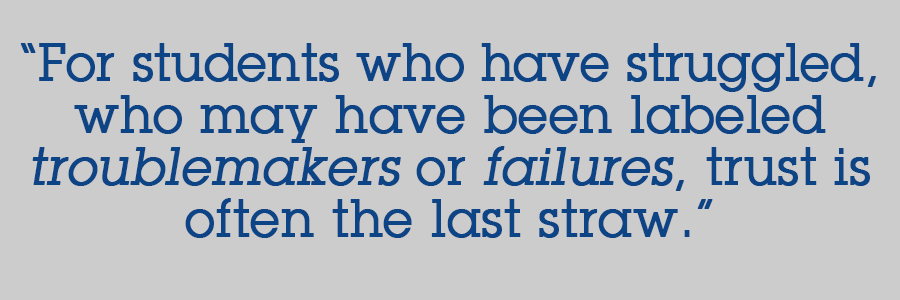Recently, the New York City Department of Education added a simple but critical element into its capacity framework for schools: Trust.
Trust, of course, is important for more than only schools. As the philosopher Sissela Bok wrote: “Whatever matters to human beings, trust is the atmosphere in which it thrives.” But trust bears particular weight in work in schools for a few reasons.
For students who have struggled, who may have been labeled troublemakers or failures, trust is often the last straw. Once these students have lost trust in educators, walking into school for them may very well feel like walking into a used car dealership—a place where you are approached by people who don’t seem to care about you, telling you things you don’t much believe in. This is what the experience of school is like without trust.
But schools themselves are complex institutions, and trust runs beyond the student-adult relationship. Schools are part family, part business, and part hospital. Like families, schools are places where adults are entrusted with the well-being of children. Like businesses, they are places where colleagues must trust each other to help each other work productively. Like hospitals, schools are places where people trust that the systems in place will help them identify their problems and address them.
But so much education reform of recent decades has yielded the disastrous side effect of eroding trust.
While standardized test scores were put in place with the laudable goal of establishing standard expectations across schools, somewhere along the line tests replaced trust in teachers’ ability to discern the skills of their own students. While literacy and math are critical abilities for all students, at some point the intense focus on these subjects began to preclude the time that was once spent on building trusting relationships. While schools need to turn around some practices that have contributed to student disengagement, somewhere along the line ideas for school turnaround were imposed on educators in a way that compromised their trust in the system.
The funny thing about trust, though, is that like love and respect, the act of seeking it may in fact have the unintended consequence of undermining it. “Trust,” as Annette Baier puts it, “is a fragile plant, which may not endure inspection of its roots.” There is a risk in New York City’s decision to include trust in its capacity framework. Will we begin publishing standardized trust assessments? Will we begin giving students scores on trust or evaluating teachers on trustworthiness?
Despite this risk, there is also great promise in recognizing that institutions so central to society as our schools—places that are simultaneously families, businesses, and hospitals—can only thrive in an atmosphere of trust. For the promise to overcome the risk, the burden rests on all of us who work in and with schools to determine how we can not only draw upon reserves of trust where it already thrives, but also—and of much greater importance for the students who have lost faith in the system—discover and revive trust where it is rare or nonexistent.
In my work with schools over the last two decades, I have had the privilege to encounter teachers, counselors, and school leaders who make this happen every day. I have spoken to former dropouts who have delved back into learning and, when asked why, explained that it is because one teacher showed them that she cared or one counselor helped them realize that this was the key to a better future. I have seen school leaders who inspire staff by the possibility of transformation, not by the pressure of tests. That inspiration is communicated onward to students who no longer feel the need to prove themselves but instead feel the need to learn.
In each case, learning is key, but the environment that allowed it to happen was trust—trust that had to flow from district to school leader, school leader to staff, school staff to students, and back up in the other direction.
There is a community of thinkers from social psychologists to moral philosophers who have emphasized that the caring, courage, and compassion that lead to trust are fundamental to what it is to be human. The question is: How can we help make these fundamental to what it is to be a school?

